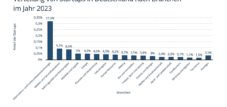Search engine marketing – AI and SEO optimization: What role do LSI keywords play in optimization for RankBrain?
Language selection 📢
Published on: December 2nd, 2024 / Update from: December 2nd, 2024 - Author: Konrad Wolfenstein

Search engine marketing – AI and SEO optimization: What role do LSI keywords play in optimization for RankBrain? – Image: Xpert.Digital
🌟 AI and SEO Optimization: The Role of LSI Keywords for RankBrain
✨ The topic of the role of LSI (Latent Semantic Indexing) keywords and their importance in SEO optimization for RankBrain is highly topical and crucial to effectively ranking content in today's digital world.
Search engine optimization (SEO) is a constantly changing field in which technology and innovation play a central role. Two concepts that are gaining traction are Latent Semantic Indexing (LSI) and RankBrain, an intelligent algorithm from Google. Both contribute significantly to improving content relevance and ranking on search results pages (SERPs). But how exactly do these two technologies interact and what role do LSI keywords play in practice?
💡 What is LSI and how does it work?
Latent Semantic Indexing (LSI) is a mathematically based method originally developed in the 1980s to efficiently index large amounts of data and identify semantic relationships between terms. However, in the field of SEO, LSI refers to the use of semantically related terms – so-called LSI keywords – to better understand and represent the context of a main keyword.
Google and other search engines analyze the content of web pages to assess relevance and consistency with users' search queries. Not only direct keywords are crucial, but also the semantic diversity of a text. The use of LSI (Latent Semantic Indexing) keywords allows search engines to capture the context and relevance of a piece of content even more precisely.
Example: Let's take the main keyword “apple”. An article that writes about apples could contain LSI keywords such as “fruit”, “vitamin C”, “nutrition” or “apple trees”. These related terms help Google to categorize and evaluate the content more precisely.
🔑 Benefits of using LSI keywords
- Improved content relevance: Semantically related terms make the content more comprehensive and relevant.
- Increased visibility: Pages with good semantic context rank higher in search results.
- Natural language: LSI keywords promote the readability and naturalness of a text because they avoid excessive keyword repetition.
🤖 What is RankBrain and how does it affect SEO?
RankBrain is a part of Google's search algorithm that was introduced in 2015. It is a system based on artificial intelligence (AI) and machine learning to better interpret search queries and provide the most relevant results. Before RankBrain, search queries were primarily processed through static algorithms. RankBrain, on the other hand, can semantically analyze new or complex queries and dynamically adjust the results.
⚙️ How does RankBrain work?
RankBrain analyzes search queries by recognizing patterns and semantic relationships between terms. It evaluates content not only based on keywords, but also on user behavior such as click-through rate (CTR), time on page and bounce rate. The most important aspects of RankBrain are:
- Learning from data: RankBrain continually improves by analyzing user data and incorporating these insights into future rankings.
- Semantic Understanding: RankBrain recognizes synonyms, similar phrases and related concepts to better understand the intent behind a search query.
- Relevance Rating: The algorithm prioritizes content that provides users with the best answers to their questions.
🌟 Why is RankBrain important?
RankBrain is particularly effective for complex or never before asked search queries. Its ability to link new terms to concepts they already know provides users with accurate results, even if they don't explicitly search for a specific term.
Example: A search query like “What are the health benefits of apples?” could be answered by RankBrain by analyzing content with semantically related keywords like “vitamin C,” “nutrition,” and “antioxidants.”
Suitable for:
🔗 The synergy of LSI keywords and RankBrain
Although RankBrain does not have a direct dependency on keywords, the integration of LSI keywords plays a crucial role in optimizing content for this algorithm. RankBrain benefits from a comprehensive semantic representation of a topic, and this is where LSI keywords come into play.
🌍 How LSI keywords support RankBrain:
- Context building: LSI keywords expand the context of a text and make it easier for search engines to understand.
- Semantic depth: By including related terms, the text not only becomes more relevant, but also more informative for the user.
- User-centricity: Content written using LSI keywords better addresses user needs and increases user satisfaction.
Example: An article about “sustainable nutrition” could contain LSI keywords such as “organic farming,” “carbon footprint,” “plant-based diet,” and “climate protection.” These terms help RankBrain evaluate the text as more relevant and comprehensive.
🛠️ Best practices for using LSI keywords:
- Stay relevant: Only use keywords that are actually related to the main topic.
- Promote naturalness: Avoid excessive keyword stuffing and instead pay attention to readability.
- Use semantic tools: Tools like Google Autocomplete, Ubersuggest or SEMrush can help identify suitable LSI keywords.
🚀 LSI keywords and the future of SEO
The increasing integration of AI into search algorithms like RankBrain shows that semantic diversity and contextual relevance are becoming increasingly important. LSI keywords not only offer advantages for search engines, but also for the user experience:
- User-centered content: Texts that rely on semantic diversity offer real added value because they cover different aspects of a topic.
- Long-term rankings: Pages with high information content and semantic depth have a better chance of surviving in the SERPs in the long term.
Despite the advantages, there are also challenges when using LSI keywords:
- No official “LSI keywords”: Google has never officially confirmed that LSI keywords are a direct ranking factor. Nevertheless, practice shows that semantically optimized content performs better.
- Time and Resource Requirement: Finding and including LSI keywords requires thorough research and careful planning.
📌 Interaction for better content
The combination of LSI keywords and RankBrain is a powerful tool for successful SEO strategies. While LSI keywords help to semantically enrich the content and expand its context, RankBrain ensures that this content is presented to users in a relevant way. Together, they help satisfy not only search engines but also readers – a crucial factor in the modern SEO world.
“The future of SEO lies in the balance between technology and user focus. Anyone who creates content that is semantically diverse and at the same time user-oriented will be successful in the long term.”
Suitable for:
📣 Similar topics
- 🌐 How LSI keywords are revolutionizing the SEO landscape
- 🤖 RankBrain and AI: The future of search engine optimization
- 📊 Latent Semantic Indexing (LSI): How Google understands text better
- 🧠 RankBrain explains: How machine learning shapes search results
- 🌳 Semantic Depth: Why LSI keywords are more important than ever
- 💡 Using LSI keywords correctly: Best practices for better ranking
- 🌟 RankBrain + LSI: The perfect combination for SEO success
- 🕵️ Semantic diversity in SEO: How to optimize for RankBrain
- 📈 SEO trends 2024: Why LSI keywords are the basis for Google's algorithms
- 🔍 LSI vs. keyword stuffing: Natural optimization through semantic terms
#️⃣ Hashtags: #KIinSEO #LatentSemanticIndexing #LSIKeywords #RankBrain #Search Engine Optimization
Our recommendation: 🌍 Limitless reach 🔗 Networked 🌐 Multilingual 💪 Strong sales: 💡 Authentic with strategy 🚀 Innovation meets 🧠 Intuition
At a time when a company's digital presence determines its success, the challenge is how to make this presence authentic, individual and far-reaching. Xpert.Digital offers an innovative solution that positions itself as an intersection between an industry hub, a blog and a brand ambassador. It combines the advantages of communication and sales channels in a single platform and enables publication in 18 different languages. The cooperation with partner portals and the possibility of publishing articles on Google News and a press distribution list with around 8,000 journalists and readers maximize the reach and visibility of the content. This represents an essential factor in external sales & marketing (SMarketing).
More about it here:
🔍✨ Semantic Depth: Why LSI keywords are more important than ever
🌐📊 In today's digital landscape, search engine optimization (SEO) has become a crucial factor in the success of online content. As Google and other search engines' search algorithms have evolved, the way content should be created and optimized has also changed. A central element of this development is the importance of LSI (Latent Semantic Indexing) keywords, which enable deeper semantic analysis of content.
🚀 Improved search engine optimization through LSI keywords
LSI keywords are not just synonyms or variations of a main keyword. They are semantically related terms that deepen the context and meaning of a topic. Using them can make content more relevant and understandable to search engines.
Clearer context and higher relevance
LSI keywords help expand the thematic scope of an article. They enable search engines to better understand the exact content and intention behind a text. This leads to a more precise classification of content and can significantly increase visibility in search results.
Adaptation to modern search algorithms
Search engines like Google use advanced algorithms based on semantic understanding. By integrating LSI keywords, content adapts to these algorithms and meets the criteria for high-quality content.
Suitable for:
❌📏 Avoiding keyword stuffing
It used to be common practice to repeat a main keyword as often as possible in a text in order to rank higher in search results. This so-called keyword stuffing is now classified as spam by search engines and can lead to ranking penalties.
Natural text design
By incorporating LSI keywords, the text becomes more varied and reads more naturally. Instead of overusing a keyword, related terms are used to shed light on the topic from different perspectives.
Improved user experience
A text that is written fluently and without unnecessary repetitions offers the reader more value. This leads to longer stays on the website and can reduce the bounce rate.
📚🌟 Increasing the depth of content
Using LSI keywords allows authors to cover a topic more comprehensively. By highlighting different facets and related aspects, more in-depth and informative content is created.
Holistic view of the topic
By incorporating semantically related terms, authors can ensure they cover all relevant aspects of a topic. This not only increases the information content, but also signals to search engines that the content is comprehensive.
Increase in authority
Content that goes into depth and highlights different facets positions the website as an authority in its field. This can lead to better rankings and greater credibility with readers.
💡🤖 The role of LSI keywords in semantic SEO
Semantic SEO goes beyond simple keyword optimization. It aims to capture and convey the deeper meaning and context of content.
Improved topic relevance
LSI keywords strengthen the connection between different content and subject areas. They help search engines to recognize the thematic connection and classify content accordingly.
Efficient communication with search engines
By using LSI keywords, authors speak the language of search engines. This makes it easier for the algorithms to understand the content and index it correctly.
✅📈 Advantages of using LSI keywords
Integrating LSI keywords offers numerous benefits that impact both search engine visibility and user experience.
Greater topic relevance
Content becomes more relevant to search engines because it paints a comprehensive picture of a topic. This can lead to better rankings and increased visibility.
Better placement in the SERPs
The improved relevance and quality of the content can increase the position in the search results pages (SERPs).
Expanding long-tail keyword coverage
LSI keywords make it possible to rank for more specific and longer search queries. These so-called long-tail keywords often have less competition and lead to more targeted traffic.
Increasing conversion rates
Because long-tail keywords are often used by users who have a clear purchase intent, they can lead to higher conversion rates.
🛠️✨ Practical tips for implementing LSI keywords
To take full advantage of LSI keywords, some best practices should be followed:
Research semantically related terms
Use tools like Google Keyword Planner or semantic analysis tools to identify relevant LSI keywords.
Natural integration
Insert LSI keywords organically into your text. Avoid forced placements that could disrupt the flow of reading.
Thematic clustering
Organize your content into thematic clusters connected by LSI keywords. This strengthens your website's internal linking and thematic network.
Updating existing content
Revise older posts to incorporate LSI keywords and bring the content up to date.
🔮🧠 The future of SEO and the importance of LSI keywords
As artificial intelligence and machine learning continue to advance, search engines are becoming better at understanding the context and intent behind search queries.
Voice assistants and voice search
The increase in voice searches via assistants such as Siri, Alexa or Google Assistant is changing the nature of search queries. These are often longer and more conversational, which further increases the importance of LSI keywords and long-tail keywords.
User experience as a ranking factor
Search engines are placing increasing emphasis on user experience. Content that is informative, relevant and well-structured is preferred. LSI keywords help meet these quality standards.
Semantic networking of content
The ability to link content semantically is becoming increasingly important. Websites that manage to build a thematic ecosystem can benefit from higher rankings and more traffic.
🔑📖 Key to a successful SEO strategy
LSI keywords enable deeper semantic analysis of content and are crucial for optimizing web pages and improving user experience. At a time when search engines are becoming more intelligent and users are becoming more demanding, LSI keywords offer the key to a successful SEO strategy.
By consciously integrating semantically related terms, authors and SEO specialists can ensure that their content is not only better understood by search engines, but also more valued by users. Investing in high-quality, well-structured and semantically rich content pays off in the long term and forms the basis for sustainable online success.
📣 Similar topics
- 📚 The power of LSI keywords: Create semantically optimized content
- 🔍 SEO Future: Why LSI Keywords Are Crucial
- ✏️ Better writing: How LSI keywords increase text quality
- 💡 Goodbye keyword stuffing: The revolution with LSI keywords
- 📈 Increase visibility: Get better rankings with LSI keywords
- 🌐 Semantic SEO: How LSI keywords strengthen context
- 🛠️ Practical tips: How to use LSI keywords effectively
- 🧠 Semantics meets SEO: Explain LSI keywords
- 🚀 SEO strategies of the future: The role of LSI keywords
- 🌍 Holistic content: More depth through semantic optimization
#️⃣ Hashtags: #LSIKeywords #SemanticSEO #Search Engine Optimization #SEOStrategies #ContentMarketing
We are there for you - advice - planning - implementation - project management
☑️ SME support in strategy, consulting, planning and implementation
☑️ Creation or realignment of the digital strategy and digitalization
☑️ Expansion and optimization of international sales processes
☑️ Global & Digital B2B trading platforms
☑️ Pioneer Business Development
I would be happy to serve as your personal advisor.
You can contact me by filling out the contact form below or simply call me on +49 89 89 674 804 (Munich) .
I'm looking forward to our joint project.
Xpert.Digital - Konrad Wolfenstein
Xpert.Digital is a hub for industry with a focus on digitalization, mechanical engineering, logistics/intralogistics and photovoltaics.
With our 360° business development solution, we support well-known companies from new business to after sales.
Market intelligence, smarketing, marketing automation, content development, PR, mail campaigns, personalized social media and lead nurturing are part of our digital tools.
You can find out more at: www.xpert.digital - www.xpert.solar - www.xpert.plus


























